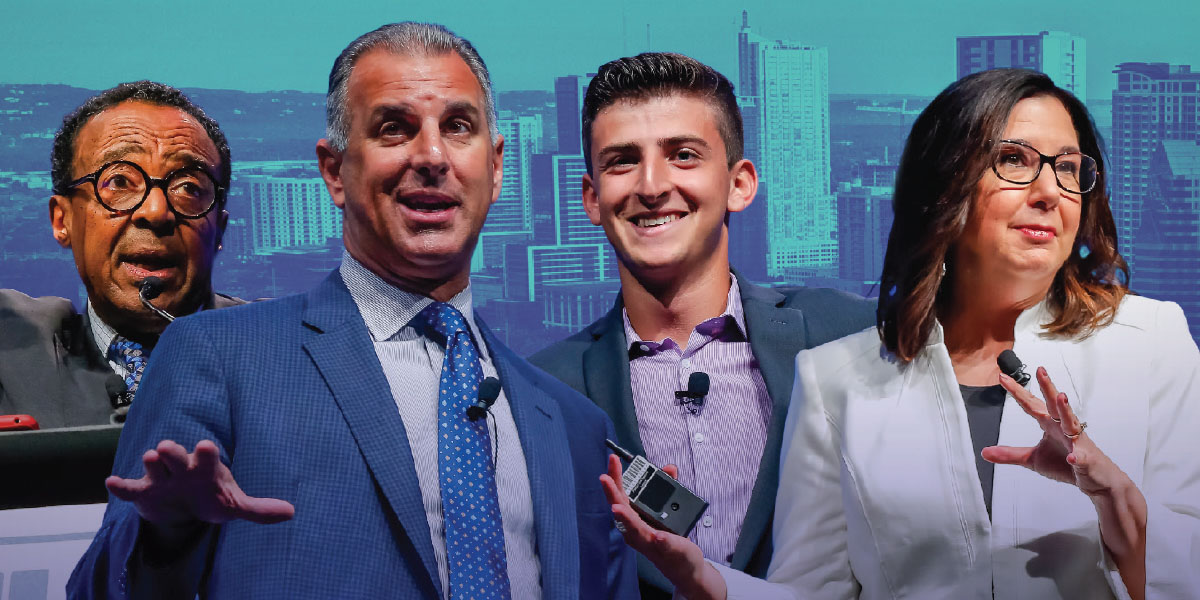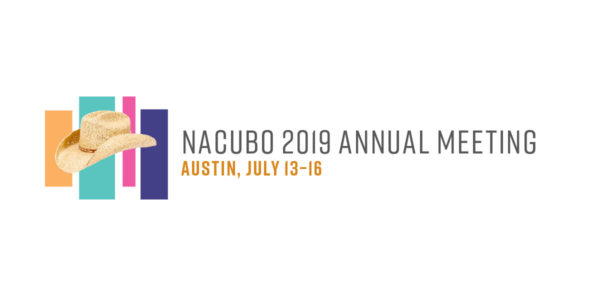
The Future of Work Is Collaborative
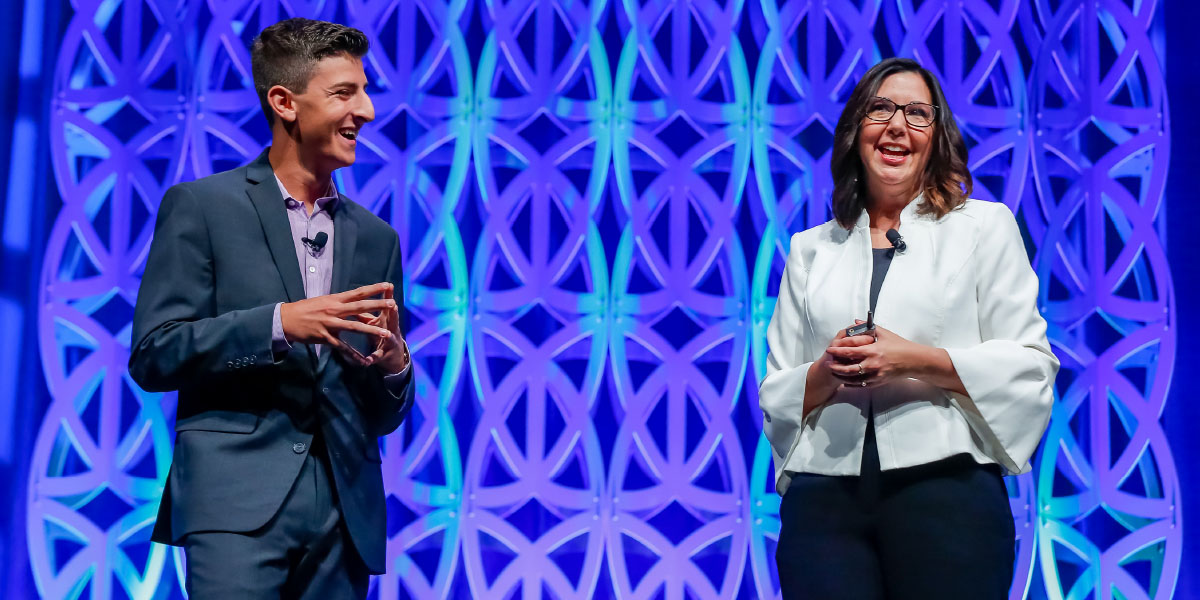
Taking the main stage on the morning of Sunday, July 14, from the generational research and management consulting firm XYZ University, Sarah Sladek, founder and CEO, and Josh Miller, director of Gen Z studies, led attendees down memory lane with a visual tour of iconic historical events, technological breakthroughs, and pop culture trends of the past six decades. From Beatlemania and a walk on the moon, to ’80s hair bands and skateboards, to 9/11, the Great Recession, and smartphones, their point was clear: Each generation is shaped by what happens in the world as it comes of age.
And that isn’t a bad thing. Nostalgia about key influencing moments and trends from our formative years is part of what builds a sense of shared experience and a common understanding with those of our same age group, said Sladek. She and Miller—introduced by Mark Oster, national managing partner, not-for-profit and higher education practices for Grant Thornton LLP—also drove home this forecast: The way we work, and educate, is on pace for far more dramatic shifts in the years ahead, and organizations must evolve in kind to survive.
While harnessing the potential of multiple generations within the workforce has always been important, for three decades baby boomers were the ones who set the stage and wrote the rules, said Sladek. Their overwhelming presence by sheer numbers ensured their place at the table and their mark on workplace culture. Now, with approximately 10,000 boomers retiring each day, and with Generation Z ushering in the most diverse and technologically savvy prospective employees, organizations must get up to speed about generational differences. Fast.
This doesn’t have to be scary, and the premise is simple, said Sladek: Understand generational differences, speak to those differences, and embrace the variety of skills and attributes each generation brings to enhance the whole. Organizations that learn to do so will continue to thrive and innovate.
Generalizations That Generally Hold True
No generation, or the individuals who constitute it, is defined by a single set of experiences or characteristics. Yet, the significant shaping forces for a particular age cohort do tend to result in similarities of outlook and behavior, which in turn can shape a generation’s approach to—and expectations about—work, said Sladek.
Consider that boomers, born into a postwar era of relative economic prosperity, were encouraged to conform and seek a largely linear progression of going to school, getting married, buying a house, and having children. By contrast, Gen Xers—often labeled latchkey kids because many were raised in households with a single parent or where both parents worked—started out watching Mister Rogers’ Neighborhood, but by the end of their high school years, MTV appealed to their sense of individuality and self-expression.
Boomer “helicopter” parents may have tried to protect their millennial children, who grew up knowing the benefits of personal technology. But, school shootings also influenced this generation, and many millennials suffered a rocky initial transition from college to career because they graduated in the shadow of the Great Recession.
The economic fallout from the Great Recession has also shaped the outlook for Generation Z, which witnessed not only the struggle of millennials to get established, but also saw their Gen X parents losing jobs or even their life savings. That instilled in this youngest workplace cohort a determination and no-nonsense approach to seek the skills that lead to job security, said Miller.
While Gen Z has never known a world without technology or the capacity to be heard via social media platforms, they’ve also had to face a new threat—the rise of cyberbullying. Yet, the fact that Gen Z represents the most culturally and ethnically diverse generation brings a positive spin to their perspective: They recognize the value of inclusion. In fact, that’s a huge strength Gen Z brings to the table, said Sladek.
Read More
Read “The Multigen Advantage” in the April 2019 issue of Business Officer to learn more about Sarah Sladek’s and Josh Miller’s thoughts on harnessing the skills of employees of all generations.
Authenticity Is Key to Z
Authenticity is also important to Gen Z, said Miller. Technology is there for ease, convenience, and entertainment, but when he and his friends want to catch up, they seek authentic, in-person conversation. It’s not a matter of either technology or personal connection, but both/and.
In line with their concerns about financial security, Gen Zers are cost-conscious and are looking for value, said Miller. That includes value when shopping for a college degree. Most appealing to members of Gen Z will be institutions that find creative ways to provide aid or loan repayment options that signal a partnership, where the institution shows confidence about a student’s potential contribution to the workforce and society.
Colleges and universities are likewise better off focusing on student success, said Miller. Gen Z is less concerned about a new library (or a pingpong table in the break room). “We want the college experience, but we also want to get in and get out because we are looking beyond to career opportunities and to starting our lives.”
In fact, many Gen Zers view college as an important path, but not the only path, said Miller. Among his generation there is renewed interest in skilled trades because they tend to be avenues to well-paying, secure jobs—jobs that are also challenging because of their increasingly technical nature due to the rise of artificial intelligence, advanced manufacturing, and robotics.
Currently, colleges and universities are not only waking up to how to serve Gen Zers in the classroom, but are also contemplating how best to welcome them into the workplace en masse in the coming years. While Gen Z doesn’t necessarily agree with traditional hierarchical structures, it does respect titles and leadership roles, said Miller.
The End of Work as We Know It
Addressing the shift in human capital is among the most difficult transitions organizations must make today—in part because it can be hard to break from the long reign of workplace traditions established by boomers, said Sladek. For premillennial generations, the expedited pace of change and requisite shifts to keep up can be stressful, and for some, seem threatening. “It may feel like the end of work as we know it—and it is,” said Sladek.
Yet, today’s workforce needs necessitate big changes. In an economy where automation and AI are set to impact nearly every industry and profession in some manner, new skills are needed alongside the tried-and-true soft skills of communication and collaboration—still very much in demand, emphasized Sladek. “A postindustrial work culture is driven by ideas, innovation, customization, inclusion, and collaboration.” All are attributes that most younger workers already espouse, she added.
Why some organizations thrive while others struggle is not due to a lack of talent, but to an organization’s inability to adapt and put people first, to put people above profits, and to stay future-focused, asserted Sladek. Foremost, putting people first means spending time on making teamwork and relationship-building priorities for your organization. Successful organizations simply must learn to capitalize on multigenerational teams.
That includes in their decision making, which must expand to invite not only the insights but also the participation of young people, asserted Sladek. Why don’t students serve on college and university boards or on curriculum committees when the decisions being made have such a large impact on them? Bottom line: Decision-making entities should reflect the vast experiences of different generations, said Sladek. Otherwise, you risk losing your innovation edge.
KARLA HIGNITE, Fort Walton Beach, Fla., is a contributing editor for Business Officer.
Expanding Access
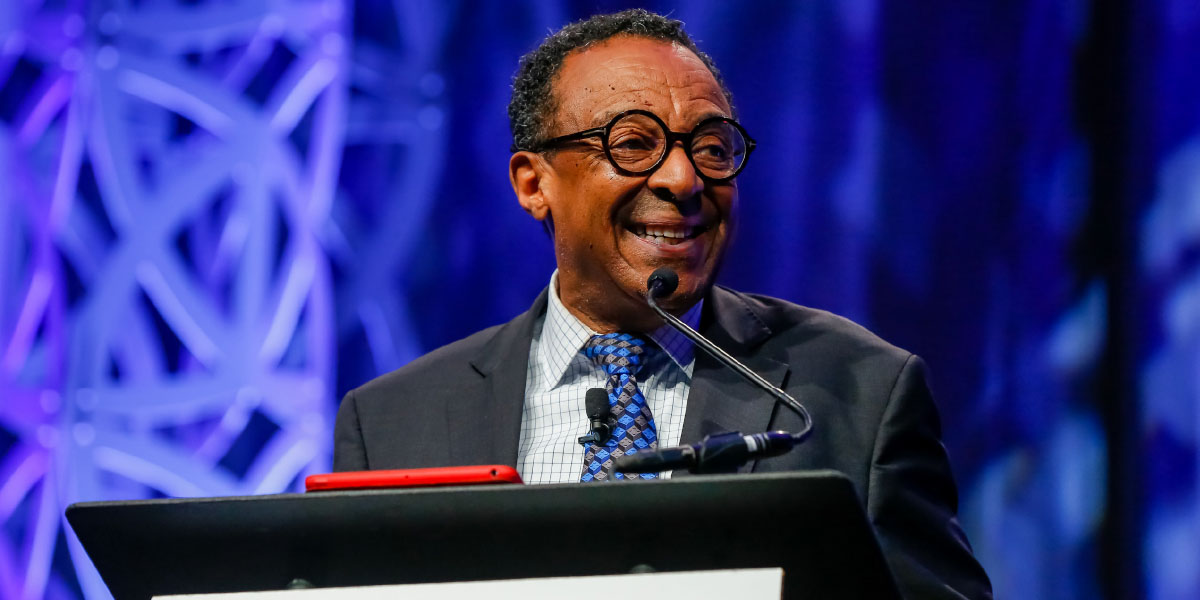
Author and Pulitzer Prize-winning journalist for the Chicago Tribune Clarence Page has never been afraid to speak his mind, and he did so with candor and wit in his keynote on fostering free speech, civil discourse, and equal access to education in our country’s increasingly divisive political climate. Page was introduced by Salli Darden, vice president of marketing and communications, Chartwells Higher Education Dining Services.
Page grew up in the working-class factory town of Middletown, Ohio, in the 1950s, after his family moved there from Alabama during the Great Migration. With many jobs available, “Ohio was a place of hope. The North was called a Promised Land by so many African Americans,” Page said. He was able to work in a steel mill over the summers to pay for his undergraduate studies at Ohio University, Athens, when tuition plus room and board was $1,240.
But Middletown has changed drastically since Page grew up, and he sees different and fewer opportunities for work there now. By the 1990s, the factories and mills that had sustained so many towns in the Rust Belt and across the U.S., including Page’s own hometown, had closed, and other large employers had left the area. Opioid abuse grew rampant in this economic vacuum, creating communities in crisis—and subsequently the context in which Donald Trump could become a successful political figure on the national stage.
During the 2016 presidential election, Trump “‘saw his opportunity and took ’em,’ as they say in Chicago politics,” according to Page. Trump saw people unhappy and catered to them, surprising many political experts, including Page, by winning the election. Page has since sworn off making predictions and instead is trying to learn more about the factors that led to this surprising turn.
Page credits J.D. Vance’s acclaimed memoir Hillbilly Elegy—about growing up among the white, Appalachian working poor in 1990s Middletown—with helping him to better understand Trump supporters. “Last year, I checked with my hometown’s leadership and found that 10 percent of the city budget had gone to ambulance calls for opioid overdoses—10 percent!” That is “a big resource that was being devoted to just holding on,” Page said.
Ultimately, says Page, “That is what I love about democracy; it fools us every so often,” He can tell the United States is a democratic rather than authoritarian nation because “people will come out and tell you what they really think,” whether by sharing unpopular opinions or voting unpredictably. But this discourse must be nurtured and rigorously defended, especially in higher education. According to Page, colleges and universities can be bastions of civil discourse and essential tools for individual and societal economic advancement. Both he and Vance were able to find their way out of lower-income situations through higher education—“College does bring opportunities; college does open doors.”
So Long, Civil Discourse?
Both sides of the political aisle have discovered the value of firing up their bases, even at the cost of increasing the country’s polarization—“Twitter Democrats and Twitter Republicans tend to be more extreme than the rest of us,” said Page. Frequently on Twitter himself, Page sees a dishonest debate happening on social media as some voices—especially those from the middle of the political spectrum—are less represented. But those voices that are represented have shown to be more active at the polls, and thus likely to have a bigger influence on the political conversation.
As a result of this increasing division, it’s becoming harder for people to discuss politics with one another in a civil manner and maintain respect for dissenting opinions. “We Americans have become not just more polarized but more tribal. If someone doesn’t like who you want to elect for county clerk, they make moral judgments about you.”
According to Page, we should be talking to more people who are not like us and engaging with ideas we may not necessarily like or agree with. One of the places this can be accomplished is on college campuses. Education leaders can help to ensure that campuses remain viable spaces for learning about different people and ideas by finding “more opportunities for diversity—treat it as a benefit, not a liability.”
Read More
Read “Spotting Silver Linings” in the June 2019 issue of Business Officer to find out why Clarence Page remains optimistic about the future of America.
Say What?
College campuses historically have been hotbeds for free speech and political upheaval. At the beginning of his career, Page covered an obscenity trial for his college newspaper in which an Ohio University student with “too-long hair” had been arrested for swearing based on antiquated 1812 laws. In his article, Page spelled out the actual word the student had said, and the entire editorial board was nearly expelled from the school for not censoring it. According to Page, we’re better off now that “language is looser and freer—and we have not all gone to perdition” as a result.
Discussions about free speech on campuses today encompass more than simply obscenities and include trigger warnings, safe spaces, and demonstrations designed to keep controversial figures from even setting foot on campus. Though much of the terminology and methods of communication have changed since the 1960s, as a country and on campus we are still engaged in discussions about how to foster civil discourse and define the limits of free speech.
When in 2016 the University of Chicago welcomed the incoming freshman class with a letter explaining that it doesn’t support trigger warnings, safe spaces, or cancelling speakers based on their subject matter, Page was inclined to agree. He believes it is harmful to learning when “students demand protection from ideas and language they don’t like.”
When Page reached out to get the opinion of media ethics professor Michael Bugeja—who is also the former director of the Greenlee School of Journalism and Communication, Iowa State University, Ames—Page was surprised by his perspective. Bugeja believes that teachers should use trigger warnings to alert students to traumatic subjects and material—which, in his media ethics class, may include graphic imagery of violent assault and sex trafficking, for example. When an assignment includes violent footage, he allows students to view it in the privacy of their own homes to prepare for the in-class discussion.
“You can’t teach by telling students to listen,” Page said, reading an excerpt from a discussion he had with Bugeja. Instead, you have to engage them with sensitivity and respect if you want to have any impact. Bugeja also advocates for fighting “‘hurtful free speech with louder free speech,’” as he did when he saw a poster on campus in support of white supremacy and covered it up with an even bigger poster about diversity. Page broadens his own perspective on current events and trends by doing the hard work of reaching out to people, asking questions, and continuing the conversation.
Securing the Future
Page finds that one of the country’s most significant ongoing challenges is preserving Martin Luther King Jr.’s vision of giving every student access to an affordable education. Following through on King’s vision requires more than just increasing access to a college education—it must also include providing more and better resources for students to help them succeed in school.
Page remembers his grandmother telling him that the doors to opportunity would open up, and “when they do, you must be ready to step inside.” Shortly after his college graduation, Page got just such an opportunity. At the time, newsrooms were “monochromatic,” Page said, and they needed perspective on covering the racial tension and urban riots that were bubbling up in the ’60s. “People who didn’t see color, didn’t have any color to see.” After more than 120 years in production, the Chicago Tribune, a newspaper founded on free trade and abolition, hired Page as one of its first black journalists.
“We need to learn how to expand educational resources for more people” to help them reach their growth potential and prepare them to seize the opportunities that come their way, Page said. “How you address change will make the difference not only in your life but in everyone else’s.”
LISA WHITTINGTON is associate editor, production, Business Officer.
Straight Talk on Success
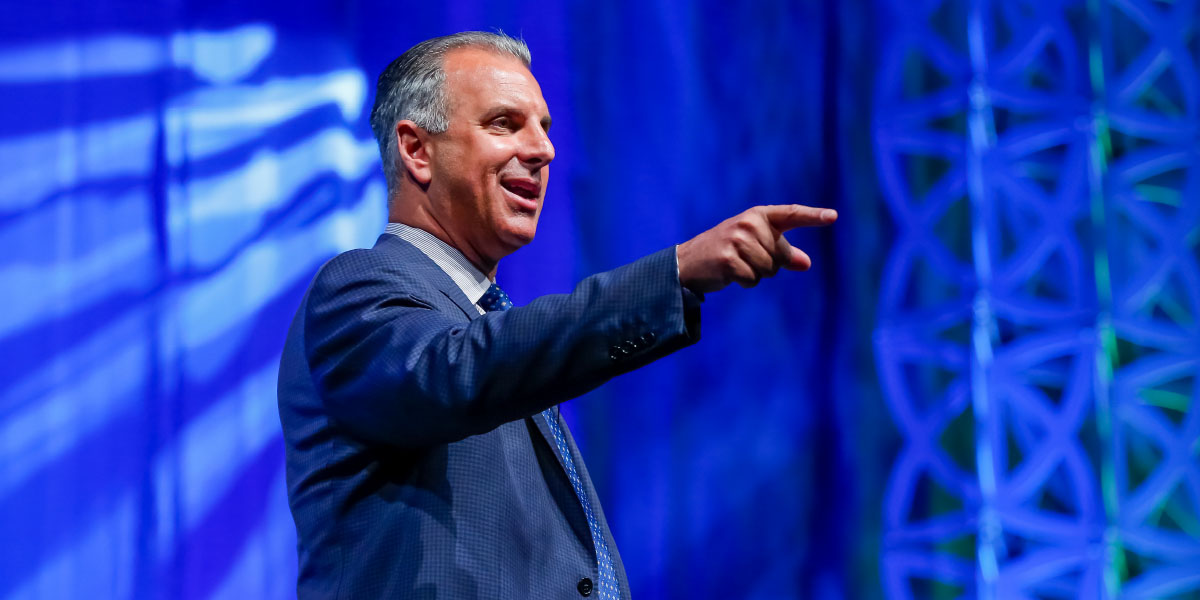
The accomplishments of veteran financial services leader Guy Adami have been shaped by a handful of guiding principles. As he concluded the annual meeting on Tuesday, July 16, Adami shared the principles that “make me tick.” He described some of the key moments in his life that have taught him powerful lessons, as well as the central tenets by which he lives and how they propelled him into a career as a successful Wall Street trader and one of the original Fast Five on CNBC’s Fast Money.
Adami was introduced by Harper Watters, managing director, higher education and nonprofit banking group, Wells Fargo Bank, who emphasized that, “As much as we plan for the future,” the workplace “will always choose talent that grows over talent that stagnates.”
Don’t Be Dissuaded
Adami cited his mother’s experience when she began law school as teaching him a formative lesson. As one of five women starting at Fordham Law School, New York City, in fall 1960, Adami’s mother faced professors who thought the only reason a woman could possibly have for attending law school was to find a husband. Adami’s mother earned her law degree and even passed the bar exam three months after giving birth to Adami. She told him: “Don’t let people define who you are and tell you what you can and can’t do in life.”
Adami himself faced similar discouragement. Expressing his interest in attending Georgetown University, Washington, D.C., Adami’s high school guidance counselor told him, “You’re never going to get in there. Why don’t you think about applying to George Washington?” To which Adami replied, “I’m not enamored with the name George, I want to go to Georgetown.”
When Adami received his acceptance letter from Georgetown, he put a copy on the counselor’s desk. Adami said he wanted to make the point that his counselor shouldn’t discourage people but should boost them up. “I don’t want to put people down, I want to build people up—that’s how I’m wired,” said Adami.
Speak Up
In 1985 on winter break from Georgetown, Adami wanted to check out what it would be like to work on Wall Street. Adami explained how early one Monday morning he took the train to Manhattan, walked into the investment bank Drexel Burnham Lambert, and sat down at a trading desk. He spent the whole day there without speaking to anyone.
Adami recalled how he did the same for the rest of the week, until on Friday when one of the traders came up to him and said, “Hey, junior, you’ve been coming here all week. What do you want?” When Adami said he was hoping to get a job in the spring, the trader said, “You should have said something to somebody.” That resonated with Adami, who said the experience helped teach him that sometimes you have to speak up for yourself.
Learn How to Take Risks Responsibly
Adami did start working at Drexel Burnham Lambert and at the time, he explained, one of the first and biggest corporate raiders was one of Drexel’s clients, Sir James Goldsmith.
There was only one trader who was allowed to speak to Goldsmith, and one day he happened to be away from his desk when Goldsmith called. In a room full of alpha personalities, everyone froze. But Adami decided to take a risk and pick up the phone, thinking to himself, “What’s the worst thing that can happen?”
Read More
Read “The Guy Factors” in the May 2019 issue of Business Officer to find out Guy Adami’s views on the multiple forces impacting the world of higher education.
Adami addressed Goldsmith’s question about the gold market in about a minute, but Goldsmith went on to explain a personal issue that was bothering him. Goldsmith was upset because his daughter was dating a cricket player, and he didn’t think it was going to work out. The two went on to have a long conversation. This drove home to Adami that “You’ve gotta take a chance.” Adami noted that taking this chance turned out to be a great opportunity to talk to the biggest client at the firm and make a name for himself.
After that initial conversation, when Goldsmith called Drexel he would ask for Adami, and they built up a good rapport. Adami recalled how one day Goldsmith made a surprising request: “Do you think you could fly to London and take my daughter to dinner?” Adami explained to Goldsmith that they didn’t exactly run in the same social circles and thought his daughter would be disappointed. Adami declined the invitation, and over time Goldsmith and Adami became very close friends. “Every once in a while, life presents you with an opportunity,” said Adami. While sometimes you have to take a shot, he added, “I’m not suggesting taking a risk just for the sake of it.”
Trust Your Instincts
“I think we’re all born with great instincts. When you rage against your instincts, that’s when you get into trouble in life,” said Adami, and offered another example from his career. In 1996, representatives from J. Aron and Co., the commodities group within Goldman Sachs, called Adami to say that they’d been following his career, and asked if he wanted to be its head gold trader. That same day Adami met with two representatives from J. Aron, and they offered him a job on the spot. When he asked if he had time to think about it, they replied, “Sure, Guy, you have all the time you want, but we need an answer before you leave this room.” Adami knew this was his first test. Would he be the right fit for the organization? Adami trusted his instincts and replied, “When do I start?”
When it became apparent to him that he was not going to make it as partner at J. Aron, Adami decided to parlay his pedigree into something else, ultimately contracting with the Canadian bank CIBC World Markets. Within a couple weeks of starting his new job, CNBC visited the office to interview employees and do a story on “miracle day,” a day when CIBC employees give their commissions to charities in the New York City region. Everyone was petrified to go on TV, Adami explained, but he trusted his instincts, took a reasonable risk, and raised his hand.
Adami’s segment was a hit and led to more appearances on CNBC and eventually to Adami being featured as one of the original lineup of traders on CNBC’s Fast Money. Initially conceived in 2006 as an eight-minute segment that would give some insight into how traders think and interact with one another, Fast Money took off and eventually grew into a daily, live, hourlong show.
Adami still had his job at CIBC and although he felt the exposure could be great for the bank, CIBC was beginning to find the situation untenable. Adami had to make a decision. He had three kids, a mortgage, and was making decent money working for the bank. He said he thought, “I can always go back to Wall Street, but an opportunity like this is probably not going to present itself again.” Adami trusted his instincts and took a risk: “Never in my wildest dream did I think that more than 12 years later we would still be around.”
Own Your Future
Adami explained that Fast Money was created to help investors—to help people navigate the world because the world is a very difficult place—and went on to describe how, when the Great Recession hit and “the world went pear shaped, there were times when I went on the show absolutely petrified, but we had to be, in some ways, the voice of reason.” Prior to 2008, Adami thinks most people didn’t believe they had the “acumen to invest on their own,” and were intimidated by the prospect of asking questions. But the Great Recession taught us that “there are no experts. The mythology and the mystique around Wall Street was broken down.” Adami hopes that Fast Money has helped “empower people to ask the right questions.”
Adami went on to cite an online survey of 1,000 American adults by BankTracker.com that showed that one in five spend more time planning their vacations than managing their finances. “There’s a sadness about that,” said Adami. And, while Wall Street bears a large part of the burden for what happened in 2008–09, so do the rest of us. “We’re all somewhat complicit; we’re all in it together.”
When it comes to helping the next generation understand the importance of saving and investing, Adami said it is crucial that financial literacy be taught in elementary school. To help educate college and university students, “have people come and speak, have classes, have clubs.” Adami imagined that if he were running a large endowment, he would want to set up an investment club that students would have to apply for, then give them a quarter of a million dollars and let them set up a portfolio. “Have them pitch stocks. Have them pitch ideas,” said Adami, and “I bet they would outperform the S&P 500.” Ultimately, Adami emphasizes, if you make financial literacy accessible and fun, “kids will get engaged.”
KIRSTEN HILGEFORD is associate editor, content, Business Officer.
Want More Annual Meeting Coverage?
Check out the opening event, lessons learned, and photos from the NACUBO 2019 Annual Meeting.



